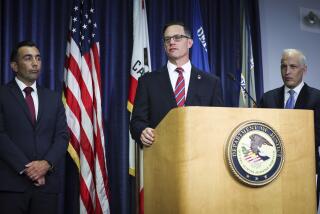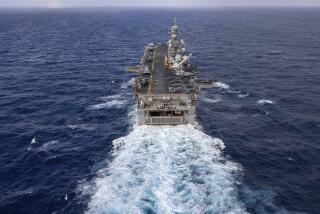Navy May Recall Accused Spies to Avoid Civil Trial
WASHINGTON — The Navy is seriously considering recalling accused spies John A. Walker Jr. and Arthur J. Walker to active duty so they can be court-martialed rather than tried in a civilian court, government sources said Friday.
Officials said the move would give the Pentagon more power to withhold sensitive military information in the quickly unfolding case, in which John Walker’s son, Seaman Michael Lance Walker, also has been charged.
Justice Department lawyers are certain to oppose any such move, which would give the military more control not only over revelations that could damage national security but also over disclosures that could prove embarrassing to the Navy.
Questions on Security
One official critical of the approach said a military trial would not work as a “quick fix for the Pentagon” in a case raising sticky questions about the adequacy of naval security measures.
He said that federal officials already had agreed to try Michael Walker, who allegedly gave his father classified documents from aboard the nuclear aircraft carrier Nimitz, in a civilian court.
Defense Secretary Caspar W. Weinberger said Thursday that the case had caused a “serious loss” to national security and that Navy procedures were being adjusted in an effort to prevent similar incidents in the future.
Disclosure of the Navy’s plans came as government sources told The Times that a fourth individual suspected of taking part in the alleged espionage ring and identified in court records only as “D” is a California man.
Federal agents have questioned “D,” who agreed to a search of his premises, but the results could not be learned. John Walker met the suspect while both served in the Navy, officials said.
Walker’s career included service in San Diego from 1969 to 1971 and in Vallejo, Calif., in 1963.
According to an affidavit unsealed Thursday in Norfolk, Va., letters that “D” wrote to Walker on Nov. 12, 1984, and last March 25 were found in a trash bag that Walker allegedly left at a rural Maryland drop site before he was arrested on May 20. The bag also contained 129 secret and confidential Navy documents.
‘Within the Law’
At the Pentagon, spokesman Michael I. Burch said it would be “within the law” to recall the Walker brothers, both of whom retired after lengthy Navy careers. Burch added that he had not heard of the Navy proposal.
Arthur Walker, 50, of Virginia Beach, Va., served on a series of submarines before he retired in 1973 as an instructor in anti-submarine warfare. His brother, a 47-year-old private detective in Norfolk, retired in 1976 after 20 years as a Navy communications specialist.
Officials in the Justice Department acknowledged that the recall move is under “serious study” in the Pentagon but said they had not yet received a formal recommendation.
Under current practice, military trials can be closed while judges are presented with government evidence that could be damaging to national security. That evidence can then be withheld from the public record.
Reviewed by Judge
Withholding provisions are much less sweeping in civilian courts, where sensitive evidence is reviewed by a judge at closed pretrial hearings. The judge then determines whether classified information is relevant and admissible as evidence.
A Justice Department official said attorneys there “are confident” that the Walkers could be tried in a civilian court without damaging national security. Department officials also said the charges that the Walkers face do not carry the death penalty in either civilian or military courts.
According to a Pentagon official, investigators are “getting cooperation” from Michael Walker, the 22-year-old seaman who was arrested aboard the Nimitz last week. The official described the sailor’s role in the alleged spy ring as “a random grabbing” of classified material.
Useful for Short Time
The sailor apparently was “not in a position to get the really heavy stuff,” the official added, describing some of the material allegedly sent to the father as useful to the Soviets for only a matter of hours or days.
As an example, he said, it could include a report of a malfunctioning pump that might have an impact on a ship’s operations for an hour or two before being repaired. A classified message to Navy headquarters would report the problem because the ship could be out of commission for that period.
A senior Pentagon official cautioned Friday against expecting any immediate detailed assessment of the specific damage. “I don’t think there’s going to be any significant or substantial outcome, or any detailed accounting, for some time,” he said.
In a related development, the federal court in Norfolk disclosed that FBI agents had obtained warrants to search an envelope that John Walker had sent after his arrest to Arthur Walker; Arthur Walker’s desk at VSE Corp., the defense contractor where he worked, and computer software, undeveloped film, videotape and tape recordings belonging to John Walker.
Staff Writer Gaylord Shaw contributed to this story from Norfolk, Va.
More to Read
Sign up for Essential California
The most important California stories and recommendations in your inbox every morning.
You may occasionally receive promotional content from the Los Angeles Times.










